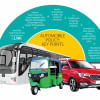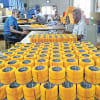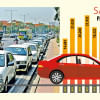USD shortage, inflation slowing automobile sales

Bangladesh's economy has been facing tough times of late as sustained high inflation, hike in interest rates and massive devaluation of the local currency continue to plague the country. In this series, we take a look back at how various industries fared amid the crisis in fiscal year 2022-23. Here is the second part on the automobile industry.
Automobile sales in Bangladesh plummeted in fiscal 2022-23, with the industry recording the steepest fall in profits among all sectors due to reduced production and demand, according to industry people.
Local automakers had to decrease production during the previous fiscal year (FY) as the US dollar crisis caused complications in opening letters of credit (LCs) for importing components and spare parts.
Besides, inflationary pressure in the country limited people's purchasing power, forcing them to focus their funds on purchasing necessities rather than luxuries like private transport, they said.
There are four listed automakers in the country -- Runner Automobiles, IFAD Autos, Aftab Automobiles and Atlas Bangladesh -- that collectively contribute to a majority of the industry's annual sales.
And as per their financial statements, the combined sales of these companies dropped 22 percent year-on-year to Tk 1,684 crore in FY23, with only Aftab Automobiles staging a growth in sales.
As such, their combined losses stood at Tk 120 crore that year following an overall profit of Tk 82 crore in fiscal 2021-22.
"Similar to elsewhere in the world, the automobile industry in Bangladesh was disrupted in fiscal 2022-23," said Shanat Datta, chief financial officer of Runner Automobiles.
This was mainly due to a shortage of materials required to manufacture vehicles as the foreign currency crisis forced the government to restrict imports, and a subdued economic environment, he added.
Bangladesh Bank data showed that local automakers opened LCs to import automobile machinery and components worth $119 million in the July-April period of fiscal 2022-23, down 21 percent year-on-year.
Likewise, the opening of LCs for importing finished motor vehicles dropped 59 percent year-on-year to $281 million at the same time.
Datta also said consumers started prioritising essential purchases in face of sustained inflation and this trend was witnessed more acutely in rural areas, where people contend with greater financial burdens.
Inflationary pressure in the country eased slightly in December 2023 to 9.41 percent after remaining at more than 9 percent since March that year, showed data from the Bangladesh Bureau of Statistics.
"These factors triggered a slowdown in the demand for low displacement motorcycles," Datta added.
On the other hand, demand witnessed a marked shift towards high displacement motorcycles, redefining the contours of the market in the process.
This could be because higher-income households remain somewhat immune to inflation, meaning that demand in the premium segment is more or less unaffected, Datta said.
Still, Runner's sales slumped 40 percent year-on-year to Tk 662 crore in FY23, with the company incurring losses of about Tk 96 crore, the first time it recorded a loss in at least 10 years.
With a production capacity of around 500 units per day, Runner manufactures nine series of motorcycles that come in 40 models with engine displacements of 50 to 200 cubic centimetres.
Runner also produces five models of three-wheelers powered by liquified petroleum gas and diesel.
But despite having suffered a tough year in fiscal 2022-23, industry people believe the business will have huge potential in the coming years thanks to the introduction of supportive policy measures.
The industry has already witnessed fresh investments of around Tk 2,500 crore ever since the formulation of the Automobile Industry Development Policy 2021, they said.
As per the policy, motorcycle manufacturers alongside three-wheeler and four-wheeler assemblers can enjoy reduced tariff on raw material imports.
With an annual production capacity of about 2,400 units, Aftab Automobiles currently assembles private and commercial vehicles designed by Japan's Toyota and Hino brands.
The company's sales soared 66 percent to Tk 118 crore in FY23, registering increased profit of Tk 41 lakh compared to Tk 10 lakh the year prior.
Shafiul Islam, chairman of Aftab Automobiles, informed that the commercial vehicle segment is facing a volatile business environment in a rapidly changing and competitive landscape.
The nationwide lockdowns due to the Covid-19 pandemic and the impacts of the ongoing Russia-Ukraine war have had a distressing effect across all sectors of the automobile industry, he said.
"However, we believe the present impact is temporary. We predict to overcome the current economic environment within the next year," Islam added.
He also said the construction of the Padma Bridge and other major infrastructure projects would have a huge economic impact on the country and its automobile industry.
The Padma Bridge connected the country's southwestern region to the capital and, as a result, a revolutionary change occurred in the transport sector.
So, as transport companies are operating on new routes, there is growing demand for air-conditioned and non-air-conditioned buses, Islam added.
IFAD Autos saw its sales slip 4 percent year-on-year to Tk 903 crore in FY23, incurring losses of Tk 15 crore for the first time in at least 12 years. The company logged profits of Tk 41 crore in fiscal 2021-22.
IFAD Autos imports different models of finished vehicles manufactured by Ashok Leyland alongside completely knocked-down units and spare parts of the Indian brand.
The company also deals in Farmtrac brand agro-machineries and the related spare parts imported from Escorts Limited.
Sales of another listed automaker, Atlas Bangladesh, nosedived 98 percent year-on-year to Tk 1.54 crore in FY23, when it incurred losses of Tk 9.6 crore following losses of Tk 4.8 crore the previous year.

 For all latest news, follow The Daily Star's Google News channel.
For all latest news, follow The Daily Star's Google News channel. 







Comments